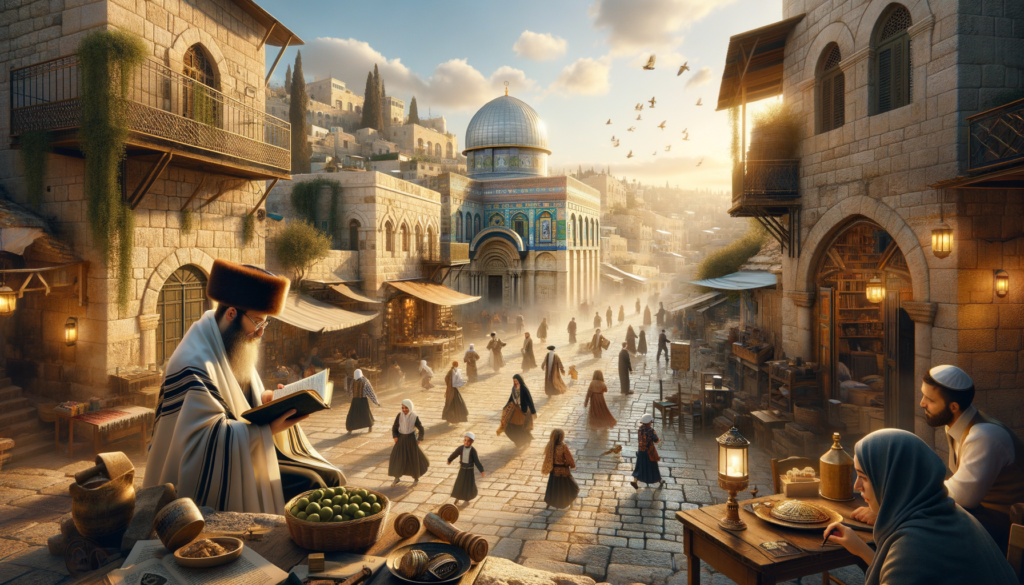A Lasting Connection: Biblical Roots of the Heart’s Bond with Israel

For so many of us, the connection we feel to the land and people of Israel is a quiet, steady flame in our hearts. It’s a bond that often transcends headlines and feels deeply personal, rooted in the timeless stories and values we cherish. People often wonder about the origins of this powerful feeling of kinship. Rather than searching for a single instruction, we can find a more beautiful answer by exploring the great themes of the Hebrew Bible—themes of heritage, resilience, the call to be a light, the joy of tending the land, and the simple, profound power of blessing. These ideas, woven like golden threads through the biblical narrative, are what have nurtured a lasting love for Israel in the hearts of generations, inspiring a desire to connect with and support its people in gentle, meaningful ways.
The Land as a Place of Ancestral Heritage
From the very beginning of the biblical story, the Land of Israel is more than just a location; it is a central character in the heritage. The narrative of Abraham’s journey to a promised land establishes it as a place of destiny and belonging. Throughout the Tanakh, the land is portrayed as a precious inheritance, a place of deep spiritual and historical memory. The Psalms are filled with a powerful yearning for this land, particularly for Jerusalem. This isn’t just a political or geographical longing; it’s a spiritual one, a desire to connect with the heart of one’s ancestral story. The sights, sounds, and scents described—the olive groves, the vineyards, the scent of wild herbs after a rain—create a sensory landscape that feels like home. This deep sense of the land as a ‘homeland of the soul’ is a powerful reason why so many people feel a personal stake in its well-being. Supporting the people who live there today—the farmers, the artisans, the families—becomes a way of honoring this ancient and enduring heritage.
This bond is strengthened when we realize that the modern-day artisans of Israel are often working with the same materials their ancestors did. The potter shapes clay from the same earth. The olive farmer presses oil from trees that are descendants of ancient groves. The weaver uses motifs that have been passed down for generations. [cite_start]By supporting them, we are doing more than making a purchase; we are becoming active participants in the preservation of this living history[cite: 29]. We are helping to ensure that the timeless traditions of the land continue to thrive, bringing beauty and meaning to a new generation. It’s a beautiful, tangible way to connect our modern lives to the ancient stories that have shaped our values and our faith.
The Value of Tending the Land
The biblical narrative begins in a garden, establishing a deep and reverent connection between humanity and the soil. The idea of ‘tending the land’ is a powerful theme that runs throughout the Hebrew Bible. It is a call to be responsible stewards of the earth, to cultivate it with care, and to find joy in its bounty. This value is beautifully embodied in the work of Israel’s modern-day farmers and food producers. They are the keepers of this sacred trust, working in harmony with the seasons to grow the olives, dates, grapes, and spices that have nourished the people of this land for millennia. Their work is a living expression of the biblical principle of preserving and nurturing our inheritance.
When we choose to support these producers, our connection becomes incredibly direct and meaningful. We are not just buying food; we are honoring the labor, the patience, and the wisdom that goes into cultivating the land. We are participating in a cycle of gratitude that is as old as the hills of Galilee. This theme inspires a form of support that is grounded, wholesome, and deeply respectful of the environment and the people who depend on it. It’s a way of connecting that feels both ancient and incredibly relevant today, reminding us of the simple beauty of a well-tended garden and the importance of those who dedicate their lives to its care.
A Story of Resilience and Rebuilding
The Hebrew Bible is not a story of unbroken ease; it is a profound testament to the power of resilience. It tells of hardship, of exile, and, most importantly, of the unwavering hope of return and rebuilding. The story of the return from Babylon and the painstaking reconstruction of the Temple and the walls of Jerusalem is one of the most powerful narratives of national renewal in human history. It is a story of a people who, despite immense loss, held onto the memory of their home and found the strength to begin again. This theme of resilience, of creating new life from the ruins of the old, is a core part of Israel’s spiritual DNA.
This incredible spirit is a major reason why many people feel such a strong connection to the people of Israel today. They see that same resilient spirit in the modern artisans and innovators. They see it in the ceramicist who shapes clay into something beautiful, in the farmer who coaxes life from the desert soil, and in the community that comes together to support one another in challenging times. Supporting these individuals feels like investing in that very spirit of hope and renewal. It is an act of solidarity with those who choose to build, to create, and to bring beauty into the world, honoring a legacy of resilience that has been a source of inspiration for thousands of years.
The Moral Call to Be a ‘Light’
Another beautiful theme found in the prophetic books, especially in Isaiah, is the idea of the people of Israel being a ‘light to the nations'[cite: 29]. This is a moral and spiritual metaphor, suggesting a calling to exemplify qualities like justice, compassion, and wisdom that can inspire the world. It frames the purpose of the people not as one of power, but of positive influence and illumination. For many who support Israel, this concept resonates deeply. They see their support not as taking a side, but as helping to nurture that light. When we support an Israeli artisan who creates beautiful, handcrafted items that bring joy to homes around the world, we are, in a small way, helping to spread that light. When we champion small businesses that operate with integrity and care for their communities, we are supporting the very values that this metaphor represents.
The Enduring Power of a Blessing
The concept of ‘blessing’ is one of the most heartwarming themes in the Hebrew Bible. It is about bestowing kindness, wishing well-being upon others, and actively contributing to their flourishing. The narrative is filled with stories where blessings are given from parents to children and from leaders to the people. This idea teaches a powerful principle: that we have the ability to bring goodness into the lives of others through our positive intentions and actions. Many people feel that supporting the people of Israel is their way of participating in this beautiful tradition. [cite_start]By purchasing from a small family business, they are directly blessing that family with stability and encouragement[cite: 36]. It is a tangible act of kindness. This perspective shifts the focus from a transactional ‘if I do this, I will get that’ mindset to one of pure, heartfelt giving—a desire to be a source of blessing to others, which is a core value throughout the biblical story.
Ultimately, the desire to stand with Israel comes from a place of love for a shared story. It is born from a reverence for an ancient heritage, an admiration for a people of incredible resilience, a belief in the call to be a light, and a commitment to the simple, beautiful power of blessing others. At Lev Haolam, we see our work as a bridge for these heartfelt connections. Each box is a tangible way to honor these biblical values—a way to bless a family, support a community, and hold a piece of a timeless heritage in your own hands.


![Image illustrating: This bond is strengthened when we realize that the modern-day artisans of Israel are often working with the same materials their ancestors did. The potter shapes clay from the same earth. The olive farmer presses oil from trees that are descendants of ancient groves. The weaver uses motifs that have been passed down for generations. [cite_start]By supporting them, we are doing more than making a purchase; we are becoming active participants in the preservation of this living history[cite: 29]. We are helping to ensure that the timeless traditions of the land continue to thrive, bringing beauty and meaning to a new generation. It’s a beautiful, tangible way to connect our modern lives to the ancient stories that have shaped our values and our faith.](/wp-content/uploads/2025/10/gen-image-1-25-1024x585.png)

